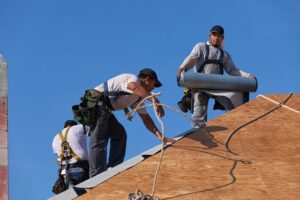
Commercial buildings require strong and durable roofs to protect against the elements and maintain a safe and comfortable environment for occupants. However, like any other structure, commercial roofs eventually reach the end of their lifespan and require replacement. In this article, we will explore the need for commercial roof replacement, how to choose the right roofing material, the roof replacement process, the cost factors involved, and the importance of hiring a professional roofing contractor.
Understanding the Need for Roof Replacement
Commercial roof replacement is a significant decision that requires thorough evaluation and consideration. It is not a choice to be made lightly, as the condition of the existing roof plays a crucial role in determining the necessity of replacement. Factors such as signs of damage, deterioration, and the overall lifespan of the roof must all be taken into account. While minor issues can often be addressed through repairs, there comes a point where replacement becomes the most practical and cost-effective solution, ensuring the long-term integrity of the building.
When contemplating roof replacement, it is essential to engage professional roofing contractors who can conduct a comprehensive assessment of the roof’s condition. They can provide valuable insights into the extent of the damage and recommend the most suitable course of action to ensure the structural stability and safety of the building. By investing in a thorough inspection, property owners can make informed decisions regarding the maintenance and replacement of their commercial roofs, ultimately safeguarding their investment for years to come.
Signs Your Commercial Roof Needs Replacement
There are several key indicators that suggest your commercial roof may require replacement to maintain optimal functionality and protection:
- Leaks or water damage: Water infiltration can lead to extensive structural issues and compromise the building’s interior.
- Visible cracks or splits: These openings can allow water to seep into the roof layers, causing further damage over time.
- Widespread blistering or peeling: These issues indicate underlying moisture problems that can weaken the roof’s integrity.
- Excessive mold or mildew growth: Mold infestations not only pose health risks but also signal poor ventilation and potential water leaks.
- Loss of granules on shingles: Granule loss can accelerate the deterioration of roofing materials, reducing their effectiveness in protecting the building.
If any of these signs are present, prompt action is crucial to mitigate the risk of extensive damage and ensure the continued functionality of the commercial property.
The Lifespan of Commercial Roofs
The longevity of a commercial roof is influenced by various factors, including the choice of roofing material and the quality of installation. While commercial roofs typically have a lifespan ranging from 20 to 50 years, proactive maintenance is key to extending their durability and performance. Regular inspections and maintenance activities can help identify potential issues early on, allowing for timely repairs and preservation of the roof’s structural integrity.
Moreover, climate conditions and environmental factors can impact the lifespan of commercial roofs, making it imperative for property owners to monitor their roofs regularly and address any signs of wear and tear promptly. By prioritizing roof maintenance and timely interventions, businesses can protect their assets, minimize operational disruptions, and uphold a safe and secure working environment for occupants.
Choosing the Right Roofing Material
When it comes to commercial roof replacement, selecting the appropriate roofing material is crucial to ensure long-term durability, energy efficiency, and cost-effectiveness.
Pros and Cons of Different Roofing Materials
There are various roofing materials available for commercial roofs, each with its own advantages and disadvantages. Here are some popular options:
- Single-Ply Membrane: Provides excellent durability and flexibility, ideal for flat or low-slope roofs. However, it may be more susceptible to punctures.
- Metal Roofing: Known for its longevity, energy efficiency, and resistance to fire and severe weather. However, it can be more expensive upfront.
- Built-Up Roofing: Offers excellent protection and can withstand foot traffic, but it can be heavy and require more maintenance.
Considering the specific needs of your commercial building, consulting with a roofing professional can help you make an informed decision on the most suitable material.
Factors to Consider When Choosing Roofing Material
When selecting a roofing material, it’s essential to consider factors such as:
- Climate and weather conditions
- Building structure and design
- Maintenance requirements
- Budget constraints
By carefully evaluating these factors, you can choose a roofing material that meets both your immediate needs and long-term goals.
The Roof Replacement Process
The roof replacement process involves several steps to ensure a successful and efficient installation.
Steps Involved in Roof Replacement
The typical roof replacement process may include the following steps:
- Initial inspection and assessment
- Preparation and removal of the existing roof
- Repairing or reinforcing the underlying structure
- Installing new roofing material
- Sealing and waterproofing
- Final inspection and clean-up
A well-executed roof replacement process is crucial to ensure the longevity and performance of the new roof.
Timeline for Commercial Roof Replacement
The duration of a commercial roof replacement project can vary depending on factors such as the size of the building, complexity of the roof structure, and weather conditions. On average, the process can take anywhere from a few days to a few weeks. It’s important to establish a realistic timeline with your roofing contractor to minimize disruption to your business operations.
Cost Implications of Roof Replacement
The cost of commercial roof replacement can vary significantly based on several factors.
Factors Affecting the Cost of Roof Replacement
Some factors that can impact the cost of roof replacement include:
- Roof size and complexity
- Choice of roofing material
- Accessibility and safety requirements
- Additional features or equipment
By understanding these factors, you can better estimate the potential cost range for your commercial roof replacement project.
Budgeting for Your Roof Replacement
Replacing a commercial roof is a significant investment, which is why budgeting is crucial. Consider obtaining quotes from multiple roofing contractors, factoring in both the upfront cost and long-term savings associated with energy efficiency and durability. It’s also beneficial to explore financing options that can help spread out the cost over time.
Hiring a Professional Roofing Contractor
When it comes to commercial roof replacement, hiring a professional roofing contractor is paramount.
Why You Should Hire a Professional
A professional roofing contractor offers several benefits, including:
- Expertise and experience in handling commercial roof replacement projects
- Knowledge of local building codes and regulations
- Access to quality roofing materials and equipment
- Warranty and insurance coverage for the installation
By entrusting your roof replacement project to a professional, you can have peace of mind knowing that the job will be done correctly and efficiently.
What to Look for in a Roofing Contractor
When selecting a roofing contractor, consider the following factors:
- License and certifications
- Reputation and references
- Insurance coverage
- Transparent pricing and contracts
- Communication and responsiveness
By thoroughly researching and vetting potential contractors, you can select a reliable and trustworthy professional for your commercial roof replacement project.
In conclusion, commercial roof replacement is a significant undertaking that requires careful consideration and planning. By understanding the signs indicating the need for replacement, choosing the right roofing material, following a systematic replacement process, budgeting appropriately, and hiring a professional roofing contractor, you can ensure a successful and long-lasting commercial roof replacement. Don’t overlook the importance of maintaining a strong and secure roof for the overall well-being of your commercial building.
Ready to secure your commercial property with a top-tier roofing solution? Look no further than Commercial Roofing Rana, where we’ve been providing exceptional roofing services to the Mid-South since 1983. Our expertise spans across industrial buildings, healthcare centers, churches, government buildings, and shopping centers, ensuring that your business is well-protected against the elements with our precision-fit Duro-Last roofing systems. Don’t wait for the next rainstorm to test your defenses. Schedule Now! and let our licensed professionals at Commercial Roofing Rana safeguard your investment with unparalleled quality and service.
